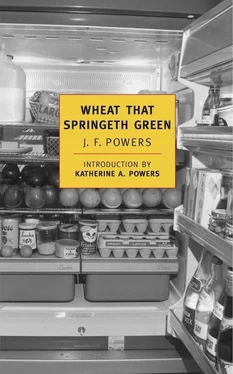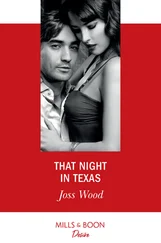J. Powers - Wheat That Springeth Green
Здесь есть возможность читать онлайн «J. Powers - Wheat That Springeth Green» весь текст электронной книги совершенно бесплатно (целиком полную версию без сокращений). В некоторых случаях можно слушать аудио, скачать через торрент в формате fb2 и присутствует краткое содержание. Год выпуска: 2000, Издательство: NYRB Classics, Жанр: Современная проза, на английском языке. Описание произведения, (предисловие) а так же отзывы посетителей доступны на портале библиотеки ЛибКат.
- Название:Wheat That Springeth Green
- Автор:
- Издательство:NYRB Classics
- Жанр:
- Год:2000
- ISBN:нет данных
- Рейтинг книги:5 / 5. Голосов: 1
-
Избранное:Добавить в избранное
- Отзывы:
-
Ваша оценка:
- 100
- 1
- 2
- 3
- 4
- 5
Wheat That Springeth Green: краткое содержание, описание и аннотация
Предлагаем к чтению аннотацию, описание, краткое содержание или предисловие (зависит от того, что написал сам автор книги «Wheat That Springeth Green»). Если вы не нашли необходимую информацию о книге — напишите в комментариях, мы постараемся отыскать её.
Wheat That Springeth Green — читать онлайн бесплатно полную книгу (весь текст) целиком
Ниже представлен текст книги, разбитый по страницам. Система сохранения места последней прочитанной страницы, позволяет с удобством читать онлайн бесплатно книгу «Wheat That Springeth Green», без необходимости каждый раз заново искать на чём Вы остановились. Поставьте закладку, и сможете в любой момент перейти на страницу, на которой закончили чтение.
Интервал:
Закладка:
After Mass, in the sacristy, nothing, just nothing, celebrant’s silence saying, “You win, I lose, you fink,” server’s saying, “Did my duty and, thanks to me, you did yours, buster,” server leaving first, celebrant about to leave — people were waiting for him and his blessing on the church lawn — when he reached out and reclaimed (it was still there) the envelope. Oh, that he hadn’t! For the envelope, like his offering now, was empty. And to stoop further, instead of wadding up the envelope and throwing it on the floor, he put it back on the counter, just so.
6. OUT IN THE WORLD
JOE WAS GENERALLY avoided during his last years at the seminary — sometimes referred to as a gadfly, which he didn’t mind, sometimes as a pain in the ass, which he did. His unpopularity was flattering in a way — in the light of “If the world hate you, know ye that it hath hated me before you,” but that was pushing it in Joe’s case. Besides, too many freaks and losers took comfort in Scripture, and Joe didn’t see himself as either. Coming from a family more than just well-to-do, and unlike most of his classmates (but like St Augustine) having lived some before entering the sem, he couldn’t be looked down on, nor could his views be gainsaid on the ground that it was a species of pride for him to cite Doctors of the Church in support of them, though this was often tried by his critics. “Pride?” he’d replied. (He’d replied a lot at the seminary.) “I’d cite you guys if you ever said anything worth citing.” That was his style.
It wasn’t so much his all-around unpopularity as something said to him in the confessional (“We have to watch ourselves. A holier-than-thou attitude toward others doesn’t become us in the sight of God”) that made Joe decide, about a month before ordination, to show more charity toward others. Maybe there hadn’t been time enough for others to notice the change in him, though, for he was still generally avoided.
About a month after ordination, at the class’s first little get-together, to which he had to be invited (he did see it like that) and which was held in a private room in a restaurant, Joe watched himself (that is, shut up) and listened to the clerical shoptalk. He enjoyed it too, though not as much as some of the others at the big table for twelve. Mooney and Rooney gloried in it. But it went on too long, and thinking, Oh-oh, here I go again, Joe said, “W. G. Ward. That name mean anything to you guys? No? Well, Ward, and not Newman, was the first convert from the Oxford Movement. He says any priest without personal knowledge of Christ, which knowledge can only come from contemplation ”—Joe had supplied and stressed that part to make his point better—“ought to seek out some desolate island so as to live alone and do no harm.”
“Words,” said Cooney, these days cultivating a worldlier-than-thou attitude. “Hard words, Joe.”
“No harder than those of Our Lord to Martha,” Joe replied.
“But you’re not Our Lord!” cried a couple of deep thinkers at the table. Joe ignored them. He quoted from Luke 10, where Martha complains that she has her hands full serving Our Lord and the Disciples and could use some help from Mary, who sits listening to the conversation, and Our Lord replies, “Mary hath chosen the best part.”
“Try telling that to the Chancery,” said Rooney, who had earlier been complaining or bragging about having to do all the work in the parish where he was the assistant.
“Contemplation’s all very well,” said Mooney. “Some of the saints, I know, went in for it. But it’s still an extra. We have to make a distinction, Joe, between following the counsels of perfection and doing the job — and a mighty big job it is — we’ve been ordained to do. How many of us can do both?”
“That so-called distinction is the biggest out in all theology,” Joe replied. “Why not do both? At least try .”
“You’re doing both at Holy Faith?” said Rooney.
Cooney cut in, “According to Lefty Beeman” (a problem priest, always on the move; formerly at Holy Faith, he was now a curate at St Isidore’s with Cooney), “the assistant at Holy Faith does the job, the pastor does the contemplating.”
Joe replied, “Well, of course, I haven’t been there as long as Beeman was. How long was he there? Six months?” This was not only cruel but wasted, and Joe, regretting it, shut up and listened to the others discuss the situation at Holy Faith.
“Two oddballs in one parish.”
“Certainly an odd appointment.”
“Crazy.”
“Not fair to Joe — as a new man, I mean.”
“Not fair to the pastor, you mean.”
“Not fair to the parishioners .”
“The Archbishop’s slipping.”
His appointment to Holy Faith, as assistant to Father Van Slaag, the only known contemplative in the diocese (among pastors), was not crazy, Joe believed. No, the Chancery must have heard of his hard times at the seminary, where he’d been the only known contemplative — he didn’t really qualify as such, he knew, unless maybe by desire, but he did have that reputation — and the Archbishop must have decided to make it two of a kind at Holy Faith. It was an odd appointment, perhaps, but it appeared odder than it was to those who recalled the efforts of the old Archbishop to strike a balance in parishes by pairing athletes with aesthetes, scholars with dunces, fat kine with lean. The new Archbishop was said to believe that his priests had enough to do without working out on each other; not that it was his policy to accommodate everybody —poker players, hi-fiers, photographers, astronomers, activists, liturgists — and not that some of his appointments didn’t smack of old-fashioned therapy: a lush in the suburbs who’d lost his driver’s license could find himself walking the corridors of a five-hundred-bed hospital in the city as a chaplain under the thumb of nuns; a big spender could find himself operating under the buddy or commissar system, with an assistant empowered to act for him and the parish in all money matters over two dollars and fifty cents.
Joe believed that his appointment, in a similar way — not, of course, in the same way — showed special concern on the part of the Archbishop, by whose wisdom and grace both pastor and assistant at Holy Faith were spared that heckling suspicion that is the lot of contemplatives, and even more of would-be contemplatives, in the modern world. With no need to apologize or explain, as each would have had to do with almost any other priest in the diocese, they could get on with or, in Joe’s case, down to the job of working and praying for their personal sanctification and salvation (and their parishioners’). And that was what they were doing, though not everything was perfect at Holy Faith.
There was the problem of the housekeeper, Mrs Cox, a plump tough-talking TV fan, who called Father Van Slaag Van to his face and Slug to her friends on the phone. (And Joe was pretty sure he was the one she referred to as Shorty.) There was the problem of Mrs Cox’s dog, Boots, a female bull terrier that would go for your ankles unless you carried a weapon. (“She’s all right,” the housekeeper would say with a hearty laugh. “She just hates men.”) Joe had found a cane in the umbrella stand and took it with him whenever he left his bedroom.
There was also the problem of Father Van Slaag. Joe, for his part, had hoped to spend most of his free time in the church, in the presence of the Blessed Sacrament, but Father Van Slaag was already doing this — the man practically lived in the church. Pastor and assistant at first were absent from the rectory for long periods, until Joe asked himself, “Shepherd, what of the sheep?” This question, which could have come from Satan (who would doubtless employ any means to get a priest off his knees and out of a church) or from the Archbishop, was resolved for Joe after he discovered that he couldn’t concentrate, let alone contemplate, when Father Van Slaag was in the church, as he was whenever Joe went there. Not wanting to ask when his free time was, or when Father Van Slaag’s wasn’t, Joe moved an old prie-dieu, which had been serving as a plant stand, into his bedroom. He now carried on from there with his spiritual exercises, and also — not the least of his duties — answered the phone there, more often than not while kneeling at the prie-dieu.
Читать дальшеИнтервал:
Закладка:
Похожие книги на «Wheat That Springeth Green»
Представляем Вашему вниманию похожие книги на «Wheat That Springeth Green» списком для выбора. Мы отобрали схожую по названию и смыслу литературу в надежде предоставить читателям больше вариантов отыскать новые, интересные, ещё непрочитанные произведения.
Обсуждение, отзывы о книге «Wheat That Springeth Green» и просто собственные мнения читателей. Оставьте ваши комментарии, напишите, что Вы думаете о произведении, его смысле или главных героях. Укажите что конкретно понравилось, а что нет, и почему Вы так считаете.












